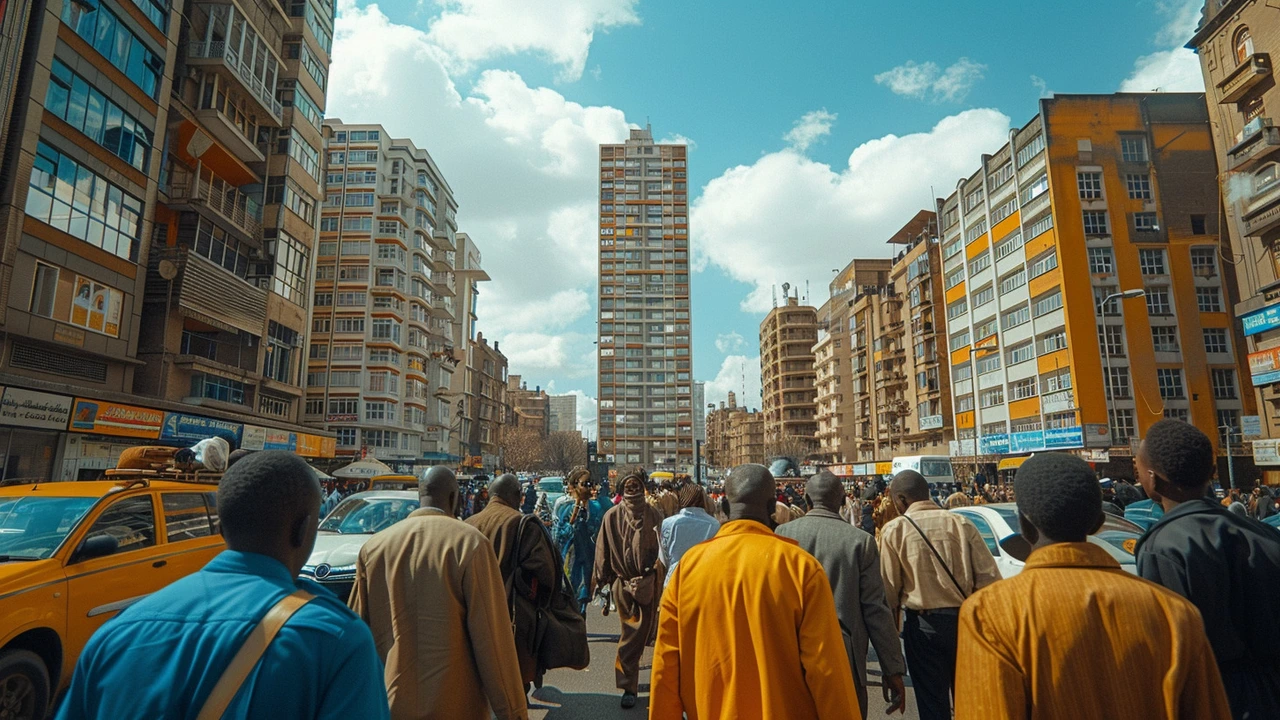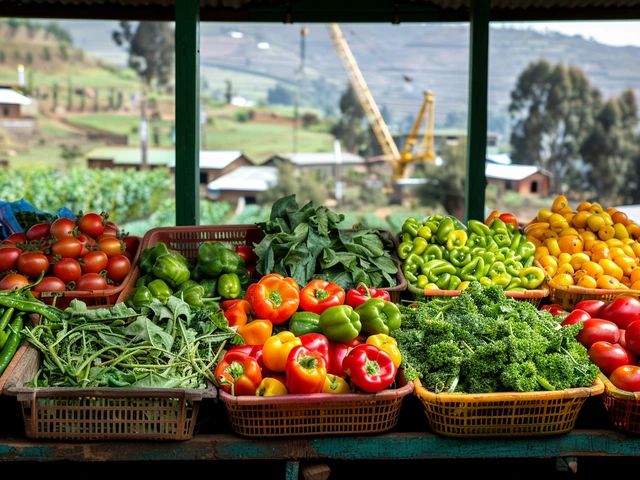Is Addis Ababa a good place to live in 2024? This vibrant city, the capital of Ethiopia, offers a unique blend of modernity and tradition, making it an interesting place for both locals and expats. Whether you are considering moving for work, exploring new cultures, or seeking an adventure, Addis Ababa can be a compelling choice. But before you make that decision, let's delve into what makes this city tick.
Addis Ababa, often referred to as the political capital of Africa, is an ever-growing urban center with dynamic offerings. However, like any city, it has its quirks. From the bustling markets to the serene coffee houses, living here can be as enriching as it is challenging. Let’s break it down to see if this Ethiopian gem is the right fit for you.
- Introduction to Addis Ababa
- Cost of Living
- Job Opportunities
- Cultural Experiences
- Safety and Healthcare
- Tips for New Residents
Introduction to Addis Ababa
Addis Ababa, the capital city of Ethiopia, sits at an altitude of around 2,355 meters (7,726 feet), giving it a unique climate that's spring-like almost all year round. Established by Empress Taytu Betul and her husband Emperor Menelik II in 1886, the city has grown to become the political, cultural, and economic heart of Ethiopia. Today, it has a population of over 5 million people and is known for its mix of modern buildings and historical sites.
One of the first things you notice about Addis Ababa is its vibrancy. The city buzzes with activity, from the lively markets like Mercato, one of Africa's largest open-air markets, to the chic cafes where locals sip on premium Ethiopian coffee. The city's name translates to “New Flower,” which is fitting, considering its continuous growth and development.
An important aspect of Addis Ababa is its status as the seat of the African Union, making it a diplomatic hub. The city hosts numerous international delegates and events, adding to its cosmopolitan feel. According to the African Union's official statement, "Addis Ababa remains a pivotal location for diplomatic engagement and international cooperation."
The geographical layout of Addis Ababa is quite fascinating. It's nestled within the Entoto Mountains, and the elevation is a contributing factor to its pleasant weather. The terrain can be hilly, which provides certain parts of the city with panoramic views. The Bole International Airport is the main gateway to the city, offering flights to major destinations worldwide.
Modern amenities coexist with traditional life in Addis. You'll find contemporary skyscrapers alongside historic churches and national monuments. One highlight is the Holy Trinity Cathedral, which is known for its stunning architecture and historical significance. Addis Ababa University, the oldest in Ethiopia, is another nod to the city's blend of old and new, offering a range of academic programs.
Public transportation in Addis Ababa has seen significant improvements with the introduction of a light rail system, the first of its kind in sub-Saharan Africa. This rail system makes commuting more accessible and has eased traffic congestion. However, traditional blue-and-white minibuses remain the preferred mode of transport for many residents. The city is also investing in infrastructure, with new roads and buildings constantly springing up.
The cultural scene in Addis Ababa is vibrant. The National Museum of Ethiopia, where the famous fossil 'Lucy' is housed, is a must-visit. The city also boasts various art galleries, theaters, and music venues that reflect both traditional Ethiopian culture and contemporary influences. Meskel Square is a central spot for public events, including festivals and political gatherings.
In terms of cuisine, Addis offers a delightful array of food options. From traditional Ethiopian dishes like injera with doro wat to international fare, food lovers have plenty to explore. Local restaurants serve meals that are rich in flavors and history. Coffee holds a special place in Ethiopian culture, and coffee ceremonies are a common social activity. It's not just a beverage here; it’s an experience.
Living in Addis Ababa comes with its set of challenges and rewards. The city is a mosaic of opportunities for those willing to embrace its unique rhythm. Whether you are moving to immerse yourself in a new culture, grow your career, or seek adventure, Addis Ababa has a lot to offer. The city's blend of ancient traditions and modern progress makes it a fascinating place to call home.
Cost of Living
Living in Addis Ababa requires some adjustment, especially when it comes to budgeting. The cost of living in the city is lower than in many Western countries, but it's important to understand the nuances. Housing is often one of the biggest expenses, and prices can vary dramatically depending on the neighborhood. For instance, a one-bedroom apartment in the city center might cost around $500 to $800 per month, whereas in suburban areas, you might find something for $300 to $600.
Food prices can be quite affordable if you choose to shop at local markets or eat traditional Ethiopian food. A meal at a mid-range restaurant may cost around $10 to $20. For those who prefer international cuisine or imported goods, costs can rise significantly. Fresh produce is readily available in markets across the city, and seasonal fruits and vegetables are both cheap and high in quality.
When it comes to transportation, Addis Ababa has a range of options, from the blue-and-white taxis to the newly expanded light rail system. Public transport fares are quite low, with most rides costing less than a dollar. However, for those who prefer driving, the cost of fuel and car maintenance can add up. Traffic in the city can be quite dense, particularly during peak hours, so this is something to keep in mind.
"Addis Ababa offers a unique blend of affordability and modern amenities, making it an attractive destination for expats," says Mesfin Mulugeta, a local economist.Utilities, including electricity, heating, cooling, and water, may cost around $50 to $100 per month for a small apartment. Internet services are available, but prices and speeds can vary. A standard broadband plan might cost around $30 to $50 per month, depending on the provider and the quality of service.
Healthcare is another critical factor to consider. While public healthcare facilities are available, they may not meet the standards some expats are used to. Many opt for private healthcare, which is more expensive but offers better service and shorter wait times. Health insurance is advisable, and many international companies provide suitable plans for expats living in Addis Ababa.
Entertainment and leisure activities are abundant in Addis Ababa. From cultural museums and theaters to vibrant nightlife and outdoor activities, there is something for everyone. Costs for these activities are relatively low compared to Western standards. For example, a movie ticket might cost around $5, and entrance to a museum less than $3.
Job Opportunities
When considering a move to Addis Ababa, one of the main concerns is the availability of job opportunities. Addis Ababa is not just the capital city; it is also the economic heart of Ethiopia. Over the years, the job market has seen significant growth driven by both local enterprises and international companies. This increasing presence of multinational corporations provides a range of opportunities, particularly in sectors like telecommunications, banking, and hospitality.
The service industry, in particular, has seen a boom in Addis Ababa. Hotels and restaurants are thriving thanks to the city’s status as a major conference hub for African and international organizations. The city's cosmopolitan nature attracts a diverse clientele, making it a fertile ground for hospitality-related jobs. Moreover, as a key player in the African Union, Addis Ababa hosts a large number of diplomatic missions, bringing in numerous opportunities for work in international relations and development.
"Addis Ababa has become a global hub for international organizations, creating numerous job opportunities for both locals and expats," says Alemayehu Geda, a professor at Addis Ababa University.
Tech and innovation are also gaining a foothold in the city. The rise of innovation hubs and incubators such as IceAddis is fostering a new generation of tech startups. Young professionals looking to break into the tech world may find Addis Ababa to be a surprising yet promising destination. The government's push towards a digital economy enhances prospects for IT and software development roles.
Education and healthcare are other sectors where job opportunities are abundant. There has been an investment in both private and public educational institutions, creating roles for teachers, administrators, and support staff. Similarly, with the expansion of healthcare infrastructure, demand for medical professionals, from doctors to nurses to administrative staff, is on an upward trend.
While the job market is opening up, it is worth noting that networking and local connections can be crucial in securing employment. For expats, learning the local language, Amharic, can be advantageous but not mandatory as English is widely spoken in professional settings. Having a local contact can often be the difference in finding opportunities quicker.
If you are considering entrepreneurship, Addis Ababa offers fertile ground. The city is bustling with small businesses from coffee shops to artisanal crafts. With the correct market research and strategic planning, there’s room for new ventures. Government initiatives to support small and medium-sized enterprises (SMEs) are also in place, providing resources and incentives to budding entrepreneurs.
Cultural Experiences
Addis Ababa brims with rich cultural experiences that showcase Ethiopia's deep-rooted history and vibrant present. When you step into this city, one of the first things you'll notice is the diversity of its cultural tapestry. From traditional Ethiopian music echoing through the streets to modern art galleries, Addis Ababa invites you to immerse yourself in a blend of old and new.
The city's museums are a great place to start. The National Museum of Ethiopia is home to some of the nation's most treasured artifacts, including the famous fossilized remains of 'Lucy,' one of the oldest known hominids. This museum not only provides insight into Ethiopia's ancient past but also highlights the country’s contemporary art scene. Moreover, the Ethnological Museum, located within the former palace of Emperor Haile Selassie, offers a deep dive into Ethiopia's ethnographic history, traditions, and creative expressions.
Beyond museums, the cultural scene extends into everyday life. Ethiopia's coffee culture is legendary, and nowhere is it more apparent than in Addis Ababa. Coffee ceremonies are an integral part of Ethiopian social and cultural life, and participating in one is a must. These ceremonies aren’t just about drinking coffee; they're about community and tradition. You'll often find these ceremonies accompanied by the time-honored practice of burning incense and the sight of the intricate jebena, a traditional Ethiopian coffee pot.
For those who enjoy outdoor markets, a visit to Mercato, one of Africa’s largest open-air markets, is essential. Here, you'll find a bustling, colorful atmosphere where vendors sell everything from spices and textiles to handmade crafts and jewelry. It’s a sensory overload in the best possible way. The energy and diversity of Mercato offer a pure slice of Ethiopian daily life and culture.
Evenings in Addis Ababa can be just as captivating. The city boasts a vibrant nightlife with numerous restaurants and live music venues. Traditional Ethiopian music and dance can be experienced at many cultural restaurants, where performers present dances from various Ethiopian ethnic groups. The music, with its distinct rhythms and melodies, provides a captivating atmosphere that is both authentic and entertaining.
To enrich your cultural journey, attending the Timket festival, which celebrates the baptism of Jesus in the River Jordan, is an unforgettable experience. This festival, marked by processions, prayer, and rituals, offers a deep look into Ethiopia's spiritual and communal traditions. Colorful attire, umbrellas, and traditional music make Timket a feast for the senses.
"Ethiopia has a rare cultural heritage, and Addis Ababa is a melting pot where you can experience it all," says Dr. Richard Pankhurst, a renowned historian on Ethiopian culture.
Modern cultural expressions also thrive in Addis Ababa. The city is home to a growing number of artists and performers who push the boundaries of contemporary Ethiopian art. Venues like the Zoma Contemporary Art Center provide a platform for local and international artists to showcase their work, often exploring themes of identity, heritage, and modernity.
In summary, Addis Ababa's cultural experiences are as varied as they are vibrant. The city offers a unique opportunity to experience a rich blend of historical depth and contemporary energy. Whether you're sipping coffee at a local ceremony, exploring ancient artifacts, or enjoying a night of traditional music and dance, Addis Ababa promises a cultural journey like no other.
Safety and Healthcare
When considering whether Addis Ababa is a good place to live, safety is often a top concern. The city, like many growing urban areas, has its mix of safe neighborhoods and areas that warrant caution. Most residents find that central districts such as Bole, Sar Bet, and Kazanchis offer a safer environment. While petty crimes, such as pickpocketing, can occur in crowded areas, violent crime remains relatively low compared to other large cities worldwide.
It’s wise to stay alert, especially in busy spots like Mercato, one of the largest open-air markets in Africa. If you adhere to standard safety measures—like avoiding poorly lit areas at night and keeping an eye on your belongings—you’ll likely have a worry-free experience. Another helpful tip is to blend in as much as possible. Flashy jewelry or expensive gadgets can make you a target for pickpockets.
The healthcare system in Addis Ababa is improving, but it’s a mix of government-run hospitals and private clinics. For basic medical needs, several clinics provide adequate care, but for more serious health issues, private hospitals such as St. Gabriel General Hospital and Korean Hospital are recommended. They offer better facilities and service quality than public hospitals, but at a higher cost. Health insurance can help defray these expenses.
If you’re an expat, securing comprehensive health insurance before moving is a smart move. This ensures access to higher-quality private healthcare. Emergency medical services are available, but response times can be slow compared to Western standards. For minor ailments, many residents rely on local pharmacies, which are well-distributed throughout the city and usually well-stocked.
Vaccinations are crucial when moving to Addis Ababa. It’s recommended to be up-to-date with routine vaccines and also get vaccinations for Hepatitis A, Hepatitis B, Typhoid, and in some cases, Yellow Fever. Healthcare providers can offer guidance based on your medical history. Remember that preventive care is essential to avoid common ailments like traveler’s diarrhea.
Water quality is another concern. Most locals and expatriates prefer boiled or bottled water to avoid waterborne illnesses. Making this a habit can greatly reduce the risk of gastrointestinal issues. When dining out, choosing restaurants with good hygiene standards is also key.
According to Dr. John Nkengasong, the Director of the Africa CDC, "Access to quality healthcare is a significant factor in improving residents' quality of life. Addis Ababa is making strides, but attention to personal health and preventive measures is crucial."
Lastly, mental health services are on the rise in Addis Ababa, but they are not as widely available as in Western countries. However, some private clinics do offer counseling and psychiatric services. Building a network of friends and participating in community activities can also support mental well-being.
Tips for New Residents
Adjusting to life in Addis Ababa can be an exciting but challenging experience. Here are some tips for new residents to help make the transition smoother. First, it’s important to understand the local culture and social norms. Ethiopians are known for their hospitality, so be prepared to accept and reciprocate invitations. Learning a few basic phrases in Amharic, the official language, can go a long way in building rapport with the locals.
Finding a place to live is one of the first tasks for new arrivals. Many expats choose to live in neighborhoods like Bole, Kazanchis, or Old Airport, which offer a range of housing options from modern apartments to traditional houses. While house hunting, consider hiring a local real estate agent who is familiar with the area and can help navigate rental agreements. Don’t forget to negotiate the rent, as prices can sometimes be inflated for expats.
Transportation in Addis Ababa can be an adventure. The city has a network of minibuses known as “blue donkeys” and a light rail system that covers several major routes. For more convenience, ride-hailing apps like Ride and ZayRide are popular among residents. Owning a vehicle is an option, but be prepared for traffic congestion and occasional road conditions that may test your driving skills. It’s a good idea to familiarize yourself with the main roads and landmarks to avoid getting lost.
Navigating the local markets and supermarkets is another essential aspect of daily life. Addis Ababa is known for its bustling markets, such as the Mercato, which is one of the largest open-air markets in Africa. Here, you can find fresh produce, spices, textiles, and more. Supermarkets like Shoa and Bambis offer a wider range of imported goods for those craving the taste of home. When shopping at local markets, don’t shy away from haggling—it’s a common practice and can help you get the best deals.
Healthcare is a critical consideration for new residents. While there are several reputable hospitals and clinics in the city, including the American Medical Center and St. Gabriel General Hospital, it’s advisable to have comprehensive health insurance that covers medical evacuation in case of serious incidents. Moreover, keeping a basic first-aid kit and familiarizing yourself with local pharmacies can be helpful in managing minor health issues.
Staying connected is crucial for both personal and professional needs. Ethio Telecom, the state-owned provider, offers various internet and mobile packages. However, the internet speed can be slower compared to what you might be used to, so patience is key. Social media platforms and messaging apps like WhatsApp are widely used for communication, making it easier to stay in touch with friends and family both locally and internationally.
Integration into the local community can be greatly facilitated by joining clubs and social groups. There are numerous expatriate associations, cultural centers, and sports clubs in Addis Ababa where you can meet people with shared interests. Participating in local events and festivals, such as Timkat (Epiphany) and Meskel (Finding of the True Cross), can also provide deeper insights into Ethiopian traditions and foster a sense of belonging.
“Addis Ababa is not just a city; it’s an experience. The people, the culture, and the vibrancy of life here offer a unique perspective that can be both uplifting and transformative.” – An Expat Resident

 Bringing Cash into Ethiopia: Limits and Tips for Travelers
Bringing Cash into Ethiopia: Limits and Tips for Travelers
 Challenges and Realities of Living in Ethiopia: Overcoming Daily Hurdles
Challenges and Realities of Living in Ethiopia: Overcoming Daily Hurdles
 Best Investment Opportunities in Ethiopia 2024: A Comprehensive Guide
Best Investment Opportunities in Ethiopia 2024: A Comprehensive Guide
 Ethiopia's Main Source of Income: Exploring its Agricultural Backbone
Ethiopia's Main Source of Income: Exploring its Agricultural Backbone
 Top Trending Careers in Ethiopia: A 2024 Insight
Top Trending Careers in Ethiopia: A 2024 Insight
Eric DE FONDAUMIERE
May 19, 2024 AT 02:20Wow, Addis Ababa sounds like a wild mix of old and new – I can totally see myself sipping coffee at a street corner and then hopping on the light rail to a tech hub!
Just imagine the vibes you’d get walking through Mercato and then chilling in a modern cafe, it’s like a cultural rollercoaster.
Definitely a place that could boost your energy and keep you on your toes.
Pauline Herrin
May 27, 2024 AT 23:49While the description is thorough, it neglects to address the systemic infrastructural shortcomings that persist in the capital, thereby offering an overly optimistic portrayal.
pradeep kumar
June 5, 2024 AT 21:17Honestly, the cost‑of‑living figures are misleading; expats will quickly feel the pinch.
love monster
June 14, 2024 AT 18:45From a mobility standpoint, the integration of the light rail with existing minibus corridors creates a multimodal network that can enhance commuter throughput, provided that headway synchronization is optimized. Additionally, the burgeoning ICT incubators are fostering a nascent ecosystem that could position Addis as a regional tech node.
Christian Barthelt
June 23, 2024 AT 16:14It should be noted that the phrase “one‑bedroom apartment in the city centre might cost around $500 to $800” is ambiguous; a clearer construction would specify “rent for a one‑bedroom apartment in the city centre typically ranges from $500 to $800 per month.”
Ify Okocha
July 2, 2024 AT 13:42The healthcare assessment is superficial at best; private facilities are expensive, and public hospitals suffer from chronic under‑funding, making the overall system unreliable for serious conditions.
William Anderson
July 11, 2024 AT 11:11One cannot merely glance at the skyline and proclaim Addis Ababa a modern marvel; such a claim borders on delusional grandeur when juxtaposed with the quotidian traffic snarls and intermittent power outages that define daily life.
Sherri Gassaway
July 20, 2024 AT 08:39In contemplating the essence of a city, one must ask whether the synthesis of tradition and modernity yields a harmonious whole or a perpetual tension that shapes the resident’s psyche.
Milo Cado
July 29, 2024 AT 06:07It is heartening to see how the vibrant cultural scene, coupled with emerging job prospects, paints a promising picture for newcomers 😊. The city’s commitment to fostering community spaces further underscores its potential as a welcoming environment.
MONA RAMIDI
August 7, 2024 AT 03:36Honestly, the “vibrant nightlife” is a far‑capped exaggeration; most evenings feel like a chaotic mash‑up of noise with little substance.
grace riehman
August 16, 2024 AT 01:04Living in Addis Ababa feels like stepping into a living museum where every corner tells a story of ancient heritage and modern ambition.
You’ll quickly learn that the people are incredibly warm, often inviting you into their homes for a coffee ceremony that lasts longer than any cafe visit you’ve had back home.
You’ll quickly learn that traffic can be a beast, but the new light rail offers a surprisingly smooth ride across the city’s hills.
Housing options range from sleek apartments in Bole to traditional houses in the outskirts, giving you a taste of both worlds.
Prices are generally lower than many Western cities, yet imported goods can still cost a pretty penny, so budgeting wisely is key.
Food lovers will rejoice with injera and doro wat on every street, but don’t miss out on the international restaurants that pop up in newer neighborhoods.
Healthcare is a mixed bag; while private clinics provide top‑notch services, the public hospitals often struggle with resources.
Learning a few phrases in Amharic goes a long way in earning respect and opening doors to community events.
The city hosts a range of festivals, from Timket to Meskel, each bringing a burst of color, music, and dance to the streets.
Nightlife can be both lively and laid‑back, with rooftop bars offering panoramic views of the Entoto mountains.
Internet speed can be hit or miss, but many locals rely on mobile data plans that keep them connected.
Safety is generally good in central districts, though like any big city, you should stay aware of your surroundings, especially at night.
Expats often form tight‑knit groups that share advice on everything from finding a reliable landlord to navigating bureaucracy.
Overall, the city’s energy is contagious; you’ll find yourself adapting to a rhythm that’s both fast and reflective.
If you’re ready for an adventure that blends cultural depth with urban growth, Addis Ababa might just be the place to call home.
Vinay Upadhyay
August 24, 2024 AT 22:33Oh sure, because after fifteen heartfelt sentences you’re suddenly qualified to be the city’s official tour guide.
Eve Alice Malik
September 2, 2024 AT 20:01Does anyone have personal experience with the reliability of the mobile internet providers here?
Debbie Billingsley
September 11, 2024 AT 17:29It is evident that Ethiopia’s rich heritage and sovereign progress make Addis a unique capital unmatched by any Western metropolis.
Patrick Van den Berghe
September 20, 2024 AT 14:58Sounds cool
Josephine Gardiner
September 29, 2024 AT 12:26The aforementioned observations concerning urban development merit further scholarly examination within the context of East African metropolitan dynamics.
Jordan Fields
October 8, 2024 AT 09:55Incorrect: “Cost of living is low.” Correct: “The cost of living is relatively low.”
Divyaa Patel
October 17, 2024 AT 07:23One could argue that the soul of Addis is a tapestry woven from the threads of ancient empires and the neon glow of tomorrow, a paradoxical dance that both haunts and inspires.
Larry Keaton
October 26, 2024 AT 04:51Yo bro, i get u – moving here can be rough but hang tight, the community’s got ur back and the vibe will grow on u fast.
Liliana Carranza
November 4, 2024 AT 01:20Let’s embrace the adventure! With an open heart and a dash of curiosity, Addis can become your next epic chapter. 🌟